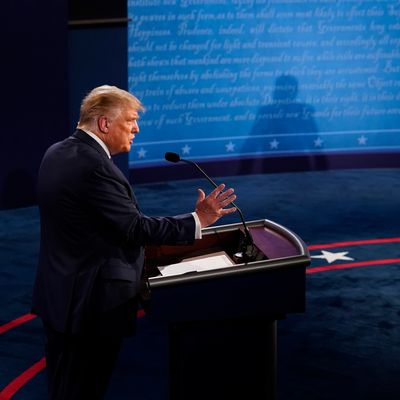
Joe Biden and Donald Trump suddenly reached a tentative agreement on Tuesday over the number, timing, and format of the 2024 presidential debates. And pundits quickly returned to one of the most masticated questions in politics: Do these debates really matter? Most political-science takes on the subject conclude that “televised presidential debates have very little, if any, impact on votes,” though there’s some evidence they can at least temporarily move the dial a few percentage points, which matters in close races. Though it rarely happens, the theoretical possibility of a clean debate kill shot like Elizabeth Warren’s demolition of Mike Bloomberg’s billion-dollar 2020 campaign on a primary debate stage keeps observers riveted to the screen when candidates clash.
In terms of the 2024 presidential election, it seems unlikely the debates will tell the vanishingly small number of persuadable voters who tune in (or more likely, who see or hear secondary news coverage) anything they don’t already know about these two old men and their rematch. But at a minimum, the debates, and before that, the debate over debates, will illustrate each candidate’s strategy for dealing with each other in the broader context of the campaign.
Before Biden’s sudden proposal for debates in June and September, and Trump’s acceptance of the challenge, the 45th president had been routinely taunting his successor on the subject, offering to debate Biden “anytime, anywhere” and suggesting unsubtly that the incumbent was too feeble and fearful to meet him with the cameras on. Clearly, negotiations between the campaigns and first-debate sponsor CNN had been going on behind the scenes for a while. More broadly, though, Trump seems to have boxed himself into a breezy accommodation of his opponent’s terms, in line with his general attitude of invincible self-confidence about the outcome of the election (unless, of course, Democrats again “rig” it).
The two candidates agreed to a studio debate on June 27 with no live audience. It’s unclear at this point whether Biden’s demand for an automatic cutoff of debaters when their time has expired will be part of the deal, and moderators — often a sticking point for Republicans in the past — have yet to be identified. But it seems reasonably clear that Trump won’t be replicating the circus atmosphere of his rallies in the debate, and that’s the environment in which he is most comfortable. In addition, no matter how much of this deal was worked out mutually before going public, the impression that Biden set the terms fits in with the newly aggressive (and above all, “vigorous”) posture the 81-year-old president has assumed since the State of the Union address. The June debate will be by far the earliest general-election face-off in history (they are typically held in October, and previously, the earliest debate was on September 23 in 1976). This means the debates will serve more as an opening than a concluding event in the long 2024 campaign. Thus, it could offer a fresh opportunity for Biden to go on the offensive and make the campaign a comparative match rather than a referendum on his unpopular presidency. That, in fact, is likely to be the ball game for the Democrat.
Another key feature of the debate agreement is the exclusion of independent candidate Robert F. Kennedy Jr., definitely from the June debate and likely from the more tentative September event on ABC. The rules announced by CNN adopted the now-defunct Commission on Presidential Debates requirement that participants regularly secure 15 percent of the vote in national polls and also obtain ballot access in enough states to make an Electoral College victory possible. Kennedy is currently at 10.8 percent in the RealClearPolitics polling averages, and is only on the ballot in four states. The latter number will eventually rise, but not quickly enough to get the candidate on the stage in Atlanta. That could in turn damage Kennedy’s credibility as a serious candidate. It’s no coincidence that the only independent presidential aspirant in history to gain access to general-election debates between major-party candidates — Ross Perot in 1992 — was also the most successful at the ballot box. Unsurprisingly, RFK Jr. quickly denounced his prospective exclusion from the 2024 debates as a uni-party conspiracy.
All in all, the debate agreement represents a quickening of what my colleague Matt Stieb fittingly called a “sluggish 2024 presidential campaign.” Even if it doesn’t really matter in the final reckoning in November, it could change the pace and intensity of the Biden-Trump fight and give the embattled incumbent a chance to take the initiative.
More on politics
- Trump Ambassador Picks: Who’s in His ‘Diplomatic Clown Car’
- What We Learned From the House Ethics Report on Matt Gaetz
- Everyone Biden Has Granted Presidential Pardons and Commutations






























